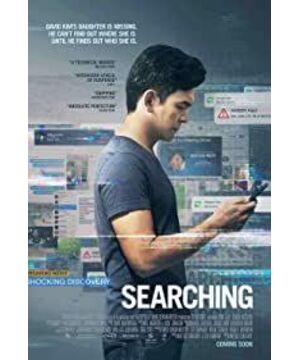2018's "The Internet Lost" can be regarded as the biggest success of the development of tabletop movies to this day. With this film, director Aneesh Chaganty not only won an award from Sundance, the most famous independent film festival abroad, but also one of the top ten independent films selected by the American Critics Association that year.
The reason why "Lost on the Internet" can finally carry the banner of desktop movies is naturally because it is the product of desktop movies that have developed into a mature stage since 2002. Whether it is the film's theme and story content or the film's narrative rhythm and editing methods, this film has gained more recognition than any previous tabletop film.
The story starts from the moment the computer desktop appears, the protagonist David creates a computer account for his daughter Margo. Then there's a fluid tabletop montage that simply and clearly shows the family's relationships, the mother's illness and death, the daughter's adulthood, and the piano lessons that set the stage.
In fact, the use of montage splicing plots to quickly pave the way for the main story is not the first of "Internet Lost". The most recent attempt of this kind on the big screen should be Lou Ye's new film "A Cloud Made of Rain in the Wind" and "The Internet Lost". Maybe it should draw on the idea of 2009's "Flying House" structure.
This fully shows that "The Internet Lost" has broken out of the rut of ordinary tabletop movies: that is, it must adhere to a strict timeline.
To illustrate this problem, we can look at the opening part of "Unfriending: The Dark Web": the hero picks up a computer, and then chats with his deaf girlfriend on the new computer to show the newly made sign language video translation software. The second part is that the hero found that the computer memory was too large, and found hidden files in the new computer while chatting in the fixed group chat room. In this desktop movie, which is still in the traditional sense, the entire movie strictly adheres to the timeline, and there will be no editing that jumps the timeline. Through the picture, we can clearly feel the secret of the male protagonist approaching the new computer step by step, thus destroying not only himself but also everyone around him.
In fact, this is the most typical way to shoot a tabletop movie. Because desktop movies actually originated from the found footage film technique. Let's take a look at the English definition from Wikipedia: a film subgenre in which all or a substantial part of the work is presented as if it were discovered film or video recordings. The events on screen are typically seen through the camera of one or more of the characters involved, often accompanied by their real-time, off-camera commentary.
In short, it is a video or video that the film itself pretends to be accidentally picked up or discovered. Just like the "Unfriending" we just saw, we seem to be hackers who hacked into the hero's computer, peeping at all the operations of the hero on the computer, but all this was filmed from a written story. The word footage means a set of (movie, television) footage. found footage can also be understood as pseudo-documentaries pseudo-documentaries. Such as the once very famous horror thriller "Blair Witch". This film form or film technology was first used in the horror thriller genre to increase the mystery and authenticity of the film itself. This has also affected the subject matter of desktop movies. To this day, it is still dominated by suspense and thrillers. The limitations of subject matter and shooting methods have made desktop movies unable to become a very mainstream movie type today. But "The Internet Lost" seems to have the momentum to bring tabletop movies into the mainstream market.
Therefore, it is not difficult for us to understand why the director would think of using montage to jump out of the fixed timeline of the genre shortly after the opening of the movie, and chose to use a method recognized by most audiences to pave the way for the main line. After all, if you honestly follow the timeline, "The Internet Lost" may become a 20-season American drama.
For this reason, many film critics believe that "The Internet Lost" is no longer a pure desktop movie, but a suspenseful commercial film using the technology of desktop movies. The entire film took only a week to shoot, but post-editing took months. All screens, including cellphone screens, surveillance footage, and online news videos, were involved. The timeline is no longer step-by-step, and the screen shots have more transitions. It's hard to tell, this is really an authentic tabletop movie.
But for most audiences, tabletop movies with suspenseful elements still have huge appeal. Foreign critics have called this the gimmick of The Internet Lost.
The element of suspense is the most favorable weapon to support the whole film. After viewers get tired of multiple video windows or watching text being typed into a dialog box and then deleted, it's the suspense that keeps their attention tied to the movie. We kept guessing where our daughter went, whether she had died, and kept wondering who would be the real murderer in the end, or if there was something else hidden. This is also the biggest innovation that this film can achieve. The way to create foreshadowing and give clues is a series of detective novels, such as a narrative that is limited from perspective, or an object that is ignored somewhere or the implication in the dialogue of the characters. The routine was a little liberated, and it became that the audience looked for clues on the father's computer desktop, and suddenly realized. Of course, due to the high-speed switching between desktops, cameras, and video calls, it would be foolish to discover the hidden key clues the first time around. Relying on the structure of the desktop movie finally kept the root of the suspense.
The novelty and suspense appeal of desktop movies is not enough to make "The Internet Lost" a hit. The theme of a movie is also very important. Behind the tender story of the father looking for his daughter, the director naturally also brought a lot of private goods. First of all, all the privacy and life trajectories of people in modern civilization are likely to be preserved on the Internet. Your personal information, email address, social media, and browsing history can all be another memory database. So my father started a series of searches. Twitter, Facebook, Picture Sharing, and later on, Tangbure and foreign live broadcast platforms, as well as Google and iOS facetime, which are always online. In the age of the Internet, even if our innocence disappears into the world, our traces on the Internet will not disappear, which may be more terrifying than leaving a photo album or diary.
In the second half of the story, when the father discovered the true whereabouts of his daughter, another social topic that the director wanted to cover gradually emerged.
Running away from home turns into a potential kidnapping rip off. Both father and daughter made headlines. People are curious. The senseless suspicion and hypocritical sympathy infuriated the father, who finally threw his fist when someone slandered his daughter. Cyberbullying is never just aimed at a certain type of person. As long as you stand in the center of the traffic, you may become the target of public criticism.
In fact, adding such social issues is a bonus for the film itself.
It is a pity, however, that tabletop movies are not suitable for in-depth discussion of such intricate social issues. They can only be integrated into the development of the storyline rather than the real purpose of the film. The audience will also sigh After that, he was quickly pushed into the excitement of solving the puzzle again.
In fact, we can sum up "The Internet Lost" in this way, all the attempts that we think are very good, including breaking away from the limitations of tabletop filming, including the exploration of social topics, and even the characters' own personalities and behavior patterns are completely serving the plot. . What the director ultimately wants to achieve or can achieve is to complete a mature and popular commercial work. The audience will give a good evaluation after watching it.
The thinking brought about by the film itself is actually not as good as "Unfriending: The Dark Web", although the latter's conspiracy theories and extreme observation of human nature have also become another gimmick.
In theory, if "The Internet Lost" can lead the audience to think about snooping, maybe this film will be more meaningful. However, based on the warm business operation, the negativity of prying itself has changed, and it has become the key to finding a daughter, which to a certain extent has washed away the immorality of prying privacy.
Viewers of the movie spy on the life of the father through the big screen; the father spy on the life of the daughter through various social media and search engines. Spying on a father looking for a missing daughter may give viewers an illusion than spying on a series of killing games in "Unfriending": as if the spying itself has a sense of justice. But this illusion can only be an illusion.
In 1998, by contrast, director Peter Weir was the one who went further. He put one of the most "cruel" reality shows on the screen, which is one of the masterpieces "The Truman World" that made Jim Carrey more famous. It is hard for us to imagine that reality shows are a variety show that has only become popular in China in recent years, but they have been deeply pondered over the past 20 years. Of course, "The Truman World" is dramatic and extreme, but it is very close to the observation of human beings: we are naturally peeping animals, and we have a strong curiosity about the privacy of others and the secrets we don't know. .
In the 21st century, peeping has become easier and potentially more dangerous. Camera-dense modern cities are essentially the overuse of high-tech technology as humans no longer trust each other. The magic of reality can always provide excellent material for filmmakers. So a series of tabletop movies were born, which, while satisfying the audience's voyeuristic demands, should also ridicule the audience's voyeuristic demands.
However, it's unlikely that "The Net" will accomplish such a task, and it will only bring a false boom to tabletop movies.
View more about Searching reviews











